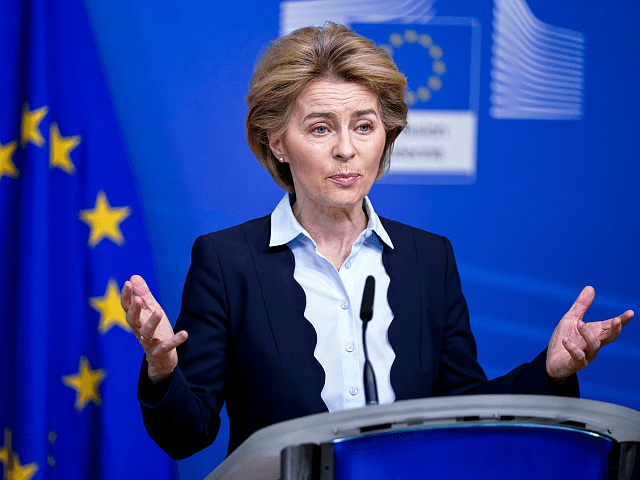The European Commission has proposed a massive €750 billion (£673bn/$825bn) Wuhan coronavirus bailout package as many across Europe have begun to question the European Union itself.
European Commission President Ursula von der Leyen announced the coronavirus bailout package in the European Parliament on Wednesday. It will consist of €500 billion in non-repayable grants and another €250 billion in loans backed by bonds.
“Today we are experiencing our own defining moment,” von der Leyen told the parliament and claimed the measures would be an investment in future generations, Die Welt reports.
“This is Europe’s moment. Our willingness to act must keep pace with the challenges we all face,” she added, claiming that European countries would not be able to solve the coronavirus economic impact on their own.
“What started with a virus so small your eyes couldn’t see it, has become an economic crisis so big that you simply cannot miss it,” she added.
The plan comes just a week after a €500 billion bailout deal was proposed by German Chancellor Angela Merkel and French President Emmanuel Macron.
Not all member states are pleased with the proposal, which could reach up to a trillion euros in the coming years. Austria, Denmark, Sweden, and the Netherlands, which have been described as the “frugal four”, have come out against the idea of giving away cash to member states without seeking repayment.
The bailout package comes after many experts and economists have warned that both the euro currency and the European Union itself faced an existential risk over coronavirus due to a lack of solidarity from wealthier member states in the north towards poorer southern states more affected by the coronavirus.
Italy, one of the countries hardest hit by cases and deaths relating to the virus, saw a wave of anti-EU sentiment in the early days of the crisis, leading polls to show nearly half of Italians thought their country would be better off outside of the EU.
Another poll released this week by Redfield & Wilton Strategies has revealed that Euroscepticism has spread to Germany and France, as well.
The poll found that 61 per cent of Italians said the coronavirus pandemic had weakened the case for the existence of the European Union, with 47 per cent of French and 40 per cent of Germans expressing the same view.
A majority of respondents in all three nations also agreed that the EU had not done enough to help their respective countries battle against the spread of the Chinese virus.
A majority, an average of two-thirds, also agreed strong national borders were important to secure their countries, a major blow to the EU’s free movement principles and the Schengen agreement which celebrated its 25th anniversary this year as most borders were closed.

COMMENTS
Please let us know if you're having issues with commenting.